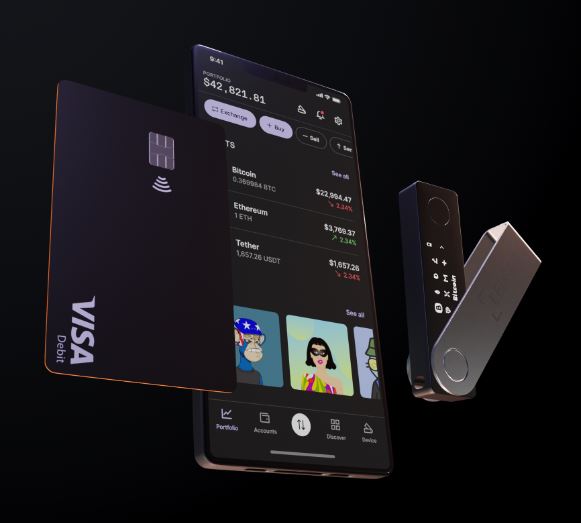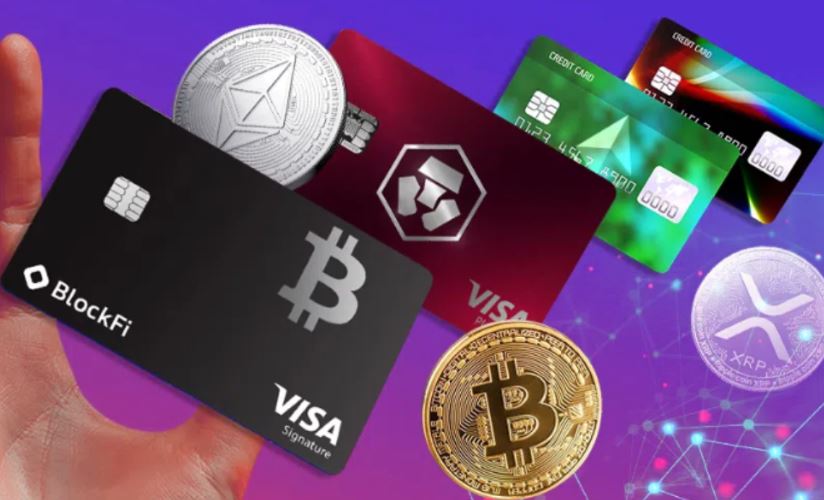Once you purchase a cryptocurrency debit card for Ethereum or Bitcoin, it is typically stored in your crypto wallet. With the funds in your wallet, you can transfer them to a different account, use them to purchase NFTs or other crypto-enabled items, or convert them to fiat currency, such as US dollars, and withdraw the funds to deposit them into your bank account.
In recent years, as the popularity of cryptocurrencies has grown, many individuals now hold digital assets that they may be interested in using for purchases but are unsure how to do so. This is where crypto debit cards come into play, allowing individuals to utilize the funds in their digital wallets to make purchases at various retail establishments, such as grocery stores and gas stations.

Although crypto cards provide a convenient way to spend your cryptocurrency, there are several drawbacks to consider. Firstly, as cryptocurrencies are treated as property for tax purposes, each purchase made with a crypto card may trigger capital gains taxes. Secondly, choosing a crypto card instead of a traditional rewards credit card means potentially missing out on cashback, travel miles, or other perks. Lastly, due to the highly volatile nature of cryptocurrencies, it is advisable to carefully evaluate whether they are a suitable investment for your portfolio. If you possess cryptocurrency and wish to use it for real-world transactions, below are the essential details you must know about acquiring a crypto debit card.
Crypto Debit Cards What Are They?
A crypto debit card functions similarly to a traditional debit card, but instead of being linked to a bank account, it is associated with a digital wallet holding your cryptocurrency. During each transaction, the value of your cryptocurrency is automatically converted into the fiat currency supported by the retailer, such as the US dollar, to finalize the purchase. This provides a convenient and flexible payment option for those seeking to spend their digital assets in the real world.
Pros & Cons Using Cryptocurrency Debit Cards
Before applying for a crypto debit card to utilize your cryptocurrency for transactions, it is essential to keep some considerations in mind.
Crypto debit cards are rapidly gaining popularity among cryptocurrency users due to the numerous benefits they offer. Here are some of the top pros and cons of using a crypto debit card.
Pros:
- Convenience: Crypto debit cards offer unparalleled convenience to cryptocurrency users, as they can be used anywhere that accepts traditional debit cards. This means that users can easily spend their digital assets in their day-to-day life without needing to convert them to fiat currencies first.
- Accessibility: Crypto debit cards can be particularly helpful for people who do not have access to traditional banking services. These cards offer an alternative payment method for those who hold cryptocurrency but do not have a bank account.
- Security: Cryptocurrency debit cards are often considered more secure than traditional debit cards. They can use two-factor authentication or biometric verification for transactions, which makes them less vulnerable to fraud and theft.
- Potential rewards: Many crypto debit card providers offer rewards or cashback in cryptocurrency for using their card. This means that users can earn additional digital assets while they spend.
Cons:
- Fees: Crypto debit cards may come with higher fees than traditional debit cards. These fees can include transaction fees, monthly or annual fees, and foreign exchange fees, which can add up quickly.
- Volatility: The value of cryptocurrency can be highly volatile, which means that the value of the digital assets on the debit card can fluctuate rapidly. This can make it challenging for users to accurately track their spending and manage their finances.
- Limited acceptance: Not all merchants accept cryptocurrency debit cards, which can limit their usefulness. This means that users may need to carry both a traditional debit card and a crypto debit card to ensure they can make purchases wherever they go.
- Security risks: Despite the potential security benefits of crypto debit cards, they can also be vulnerable to hacking and other security breaches. This can put users’ digital assets at risk and lead to significant financial losses.
In conclusion, before deciding whether to use a crypto debit card, it is essential to research different providers and compare their fees, security features, and other benefits.
How To Get Your First Crypto Card
If you’re interested in obtaining a crypto debit card, the first step is to create an account with a reputable cryptocurrency exchange or digital wallet. Once you have created an account, you will need to transfer cryptocurrency into your account or purchase it through the exchange or wallet.
To get started, you should research different crypto debit card providers and compare their features, fees, and security measures. Some popular providers include Coinbase, Bitpay, and Crypto.com. Each provider offers different benefits, such as cashback rewards, lower fees, and additional security features.
Once you have chosen a provider, you will need to link your crypto wallet or exchange account to your debit card. This typically involves entering your wallet or exchange account information into the provider’s website or mobile app. Some providers may also require additional verification steps, such as uploading a government-issued ID or completing a Know Your Customer (KYC) process.
After you have linked your account, you can start using your crypto debit card to make purchases at any merchant that accepts traditional debit cards. When you make a purchase, the value of the cryptocurrency on your card will be converted to fiat currency at the current exchange rate.
It’s worth noting that while crypto debit cards offer convenience and accessibility, they may come with higher fees and be subject to volatility in the cryptocurrency markets. Therefore, it’s important to carefully consider your financial goals and risk tolerance before deciding whether to use a crypto debit card.
In conclusion, obtaining a crypto debit card requires creating an account with a reputable cryptocurrency exchange or digital wallet, linking your account to the card provider, and then using the card to make purchases at merchants that accept traditional debit cards. By researching different providers and comparing their features, fees, and security measures, you can find the best crypto debit card for your needs.
Which Crypto Debit Card Is Right For Me?
When it comes to choosing a crypto debit card, there are a few top providers to consider based on your needs and preferences.
Coinbase is one of the most well-known cryptocurrency exchanges in the United States, and their Coinbase Card allows you to use your cryptocurrency to make purchases both online and in-person. This Visa debit card is available to select US customers and can be used anywhere that accepts Visa.
Another popular option is Crypto.com, which offers a range of debit card options with varying rewards depending on how much you’re willing to pay in fees. Some of the benefits of Crypto.com’s debit cards include cashback rewards, airport lounge access, and no foreign transaction fees.
The Binance Visa Card is another option to consider, which offers up to 8% cashback on purchases made with Binance Coin (BNB). This card is available in more than 200 countries and regions, making it a good option for international travelers.
Lastly, the Robinhood Cash Card is a recently announced crypto debit card that allows you to spend both fiat currency and cryptocurrency. This card is linked to your Robinhood investment account and offers cashback rewards for purchases made with select merchants.
When choosing a crypto debit card, it’s important to consider factors such as fees, rewards, and security features. By researching different providers and comparing their offerings, you can find the best crypto debit card for your needs.
Is it possible to use a major bank’s debit card for crypto transactions?
At present, major bank debit cards such as those from Chase, Bank of America, Citibank, and Wells Fargo do not typically support direct cryptocurrency transactions. However, you may be able to use a crypto debit card at their ATMs, although fees may apply.
If you’re new to the world of cryptocurrency, it’s important to understand the basics of buying and selling bitcoin, as well as how to keep your digital assets and funds secure. It’s recommended to do your research and take necessary precautions before investing in cryptocurrency to minimize risk and ensure a positive experience.
Check out our other articles related to crypto and money here
